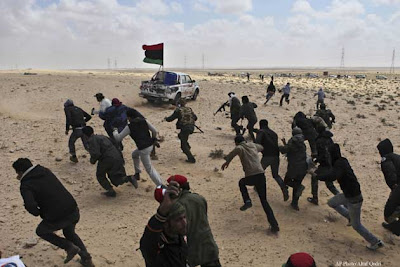Officials in Libya's transitional government said Muammar Gaddafi has been killed in the fall of his hometown Sirte earlier today. But there was no official confirmation from the country's most senior leaders.
 |
| Minister Mahmoud Shammam |
He said he expects the prime minister to confirm the death soon, noting that past reports emerged 'before making 100 per cent confirmation.' 'Our people in Sirte saw the body... Mustafa Abdul-Jalil will confirm it soon,' he told The Associated Press.
'Revolutionaries say Gaddafi was in a convoy and that they attacked the convoy.' Colonel Roland Lavoie, spokesman for Nato's operational headquarters in Naples, Italy, said the alliance's aircraft on Thursday morning struck two vehicles of pro-Gaddafi forces 'which were part of a larger group maneuvering in the vicinity of Sirte.' But Nato officials, speaking on condition of anonymity in accordance to alliance rules, said the alliance also could not independently confirm whether Gaddafi was killed or captured.
The spokesman for Libya's transitional government, Jalal al-Gallal, and its military spokesman Abdul-Rahman Busin said the reports have not been confirmed.
The caution in making a definitive announcement came because past reports of Gaddafi family deaths or captures have later proven incorrect, even after they were announced by officials, because of the confusion among the revolutionary forces' ranks and the multiple bodies involved in commanding their fighters.
For Barack Obama and his national security team, the simultaneous fall of Sirte and the death of Muammar al-Qaddafi provide an important punctuation mark in their successful initiative to support Libyan rebels and bring an end to an odious dictatorship.
The political benefits that accrue to the president at home will be modest. Domestic issues command the attention of American voters. What's more, the president's Republican opponents don't want to talk about the war on terroris very much. And with good reason. The president's record is for the most part too good to take issue with.
The president came into office promising to get the United States out of a disliked war in Iraq and has kept the promise. He came in promising to shift the focus to Afghanistan and finishing the business of decapitating al Qaeda. He did both. Bin Laden is dead. And we are committed to coming home from Afghanistan, too. While the administration's response to the first stirrings of rebellion in the United States, Occupy Wall Street, Restoring relations with our European allies, engineering the "pivot" in priorities to Asia cited by Secretary of State Clinton, and the recognition of the growing importance of dealing with emerging powers are all developments that are going to determine his chances of re-election.
But more important than any political benefits that accrue to the president as a result of this successful outcome to the Libya effort is that it brings into focus an important shift in U.S. national security strategy, a doctrine that stands alongside Clinton's "pivot" as one of the signature contributions of Obama and his security policymakers. Indeed, although I am reluctant to throw around the term "doctrine" because it has become devalued through overuse, I believe it puts into focus what can and should be identified as the Obama Doctrine, which we've all seen to mean, "Kill all terrorist threats".
This doctrine stands in contrast to the famous doctrine named for General Colin Powell. Powell's approach turns on the idea that prior to military action being taken by the United States; we must first exhaust all other means of advancing our national interest and then when we engage that we use every available means to achieve clearly defined goals and thus be able to execute a reasonable exit strategy.
 |
| General Colin Powell |
This approach was, more than anything else, a reaction to the problems the U.S. encountered in Vietnam and the "every available means" or "overwhelming force" element was clearly a manifestation of a deep pockets view of U.S. resources that now seems like the quaint echo of a bygone time.
The Obama Doctrine, while also grounded in the idea that we must exhaust every other means of advancing our national interest, is responding to the lessons of a different unpopular war, in this case, Iraq. It is a reaction against the use of "overwhelming force" to achieve rather narrow (not to mention dubious) goals. It is an antidote to "shock and awe," "three trillion dollar wars" and unilateral conventional invasions if they can possibly be avoided.
 |
| The New Obama Doctrine |
Whereas the Bush administration engaged in an open checkbook approach to a global "war on terror" (a perversion of the Powell doctrine that was especially uncomfortable for Powell himself to watch unfold), Obama's approach -- in fighting terror, getting Bin Laden, assisting with the ouster of Qaddafi, and elsewhere -- has been not only to cast aside the term "war on terror" but also the strategies and tactics of massive ground war.
Obama & Co. embrace the orthoscopic alternative to the open heart surgery favored by the Bush team. The Obama Doctrine prioritizes the use of intelligence, unmanned aircraft, special forces, and the leverage of teaming with others to achieve very narrowly defined but critical goals. That word leverage is the key. It is about using technological superiority, effective intelligence, surprise, and smart collaboration to make the most of limited resources and do so in a way that minimizes risks to both personnel and to America's international standing and our bank account.
"Leading from behind" is an important element of this doctrine. It is no insult to lead but let others feel they too are architects of a plan, to lead without making others feel you are bullying, to lead but do so in a way in which risks and other burdens are shared. Libya is a test case for this approach. It too started ugly and there are many lessons to be learned by NATO and the United States about how to do this better. Our communications around the time of undertaking the involvement were also handled in a ham-fisted manner. No matter. Most of that will be forgotten now. Outcomes matter most and the outcome here has been low-cost and high-reward.
More importantly, perhaps, it solidifies an Obama approach to meeting international threats that seems better suited to America's current capabilities, comparative advantages, political mood and the preferences of our allies everywhere than prior approaches which were created in and tailored to far different times.
"Leading from behind" is an important element of this doctrine. It is no insult to lead but let others feel they too are architects of a plan, to lead without making others feel you are bullying, to lead but do so in a way in which risks and other burdens are shared. Libya is a test case for this approach. It too started ugly and there are many lessons to be learned by NATO and the United States about how to do this better. Our communications around the time of undertaking the involvement were also handled in a ham-fisted manner. No matter. Most of that will be forgotten now. Outcomes matter most and the outcome here has been low-cost and high-reward.
More importantly, perhaps, it solidifies an Obama approach to meeting international threats that seems better suited to America's current capabilities, comparative advantages, political mood and the preferences of our allies everywhere than prior approaches which were created in and tailored to far different times.
 |
| Let's See; Who's Next |

































